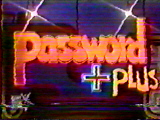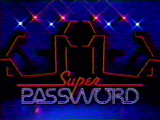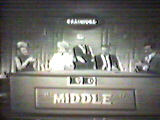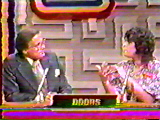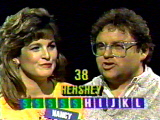Password
From RulesWiki
| PASSWORD | |
| The opening titles for Password, Password Plus, and Super Password. | |
|---|---|
| Airdates: | CBS October 1961 - September 1967; ABC April 1971 - June 1975 (November 1974 - February 1975 as "Password All-Stars"), NBC January 1979 - March 1982 ("Password Plus"), NBC September 1984 - March 1989 ("Super Password") |
| Hosts: | Allen Ludden, Bill Cullen, Tom Kennedy, Bert Convy |
| Announcers: | Bob Marcato, Jack Clark, Frank Wayne, Bern Bennett, Lee Vines, Gene Wood, Bob Kennedy, John Harlan, Rich Jeffries |
| Regular Guests: | Betty White, Lucille Ball, Dean Martin, Carol Burnett, Nipsey Russell |
| Producers: | Mark Goodson-Bill Todman Productions (1961-1982); Mark Goodson Productions (1984-1989) |
Contents |
Gameplay
1961-1967 version
Two teams of two--one celebritiy and one regular player--compete. One member of each team (always the celebrities or the contestants) is given a word, and takes turns giving a one-word clue to get the partner to say the word. If a receiving player guesses the word on the first clue, the team scores 10 points; otherwise, one point is deducted for every subsequent clue that is necessary. Clues that consisted of more than one word, or clues that contained a hyphen (the word "in-laws", for example), were not allowed and forfeited the team's turn if used. The celebrity and contestant took turns giving the clues for each word. The first team to score 25 points won $100 and advanced to the Lightning Round.The Lightning Round was a 60-second bonus round in which the celebrity tried to convey five different passwords to his partner. Each word that the player correctly guessed earned an additional $50, for a maximum of $250 if the player got all five. The celebrity could pass on a word if they got stuck, but was not allowed to go back to it once the word was passed.
On the daytime version, contestants played two matches, one with each celebrity. On the primetime versions, three games were played per episode, each with two new contestants.
1971-1975 version
1971-1974 format
When the show returned to air in 1971, it was brought back with essentially the same format as before. However; at the start of a particular word, the clue-giver had the option to "play" the word as normal, or "pass" control to the other team (in the hopes that they would get the word on the rebound). A six-clue limit was also imposed on each word. Also, at the end of the Lightning Round, the team had the option of playing a "betting word", risking any or all their Lightning Round winnings on one final word that they would have 15 seconds to guess. Winning contestants could stay until defeated or until reaching the ten-win limit (which was later removed). The final year of the original format was played as a best-of-3 match, with the Lightning Round doubling to $100 a word.
1974-1975 format ("Password All-Stars")
In November of 1974, the format of the game underwent a major overhaul. Titled "Password All-Stars", it employed only celebrity players, with the same six stars playing for an entire week. At the start of each game, two celebrities alternated giving clues to passwords for the other four celebrities, who would lock in with a buzzer if they believed they knew the word. If they got the word right, they scored a point; otherwise, the star was locked out for the rest of the word. The first two stars from the panel to score two points would advance to the next round, choosing one of the two clue-givers as their partner.
The second round was the standard game of Password, with another new rule implemented. The first clue-giver now had the choice to play the word for double score on the first clue, with the same opportunity given to the other team if they did not get the word on the first clue. The first team to score 50 points won the game and played the "20/20" round. In the 20/20 round, the team had 20 seconds to score another 20 points by guessing two passwords; giving for one and receiving for the other. On Friday, the four stars that had amassed the most points would play for $5000 for his or her representative charity. The six weekly winners then returned for a Grand Master tournament with a $25,000 grand prize.
1975 format
When ratings for Password All-Stars were below expectations--largely because of the absence of regular players--the game was tweaked yet again. This time, the panel consisted of four contestants who competed to advance to the second round in the same manner as the All-Stars format. The rules for the second round were exactly the same as the All-Stars version.
The winning team played a new rendition of the Lightning Round. This was played in three stages, each one consisting of three passwords that had to be guessed in 30 seconds. The first stage was played for $50 a word plus $5 for every second left on the clock. This in turn became the value of each word in the second round, plus $10 for every second left on the clock. In the third stage, the team could multiply their winnings by ten if they guessed the last three words in less than 30 seconds.
For example, if the team cleared the first stage with 10 seconds left on the clock, each word in the second round would now be worth $200 ($150 + $50). If this round was cleared with 10 seconds left, the contestant would now have $600 (second stage) + $100 (remaining time) = $700, making the third stage worth $7000.
1979-1982 version
When Password returned in 1979 as Password Plus, the format was again changed. In this version, each password was also a clue to a "Password Puzzle", and the receiver that guessed a password would get to guess the puzzle. Each puzzle had a maximum of five clues; if the reciever could not guess the puzzle on the last clue, his or her partner had a chance to guess it; if the other teammate could not guess the puzzle, it was thrown out and a new puzzle was played. Clue-giving responsibilities alternated with each puzzle (as opposed to each word), and with the exception of the first few weeks, the team that guessed the word would retain control for the next word.The first two puzzles that were solved won $100 each; every subsequent puzzle was played for $200. The first team to score $300 won the game and advanced to the Alphabetics round. At some point after Tom Kennedy became the host, the goal was $500; the first three puzzles were worth $100, remaining puzzles were worth $200, and players swapped celebrity partners midway through the game.
The new bonus game "Alphabetics" consisted of ten words starting with consecutive letters of the alphabet (from A to J, for example). The celebrity had 60 seconds to convey all ten words to his or her partner. Each word that the player guessed won $100; getting all ten won a jackpot that began at $5000. If an illegal clue is given during the round, the grand prize was reduced by 20%. The contestant would then play the next game with the other celebrity.
1984-1989 version
The most recent incarnation of Password was played in the same manner as Password Plus, with a few changes in procedure. In this version, the first puzzle was worth $100, and each subsequent puzzle was worth $100 more than the last. Whoever solved the second puzzle got the chance to play a bonus word, called the "Ca$hword", with his or her partner. With the celebrity giving up to three clues, the player had to guess a more challenging word (such as "Shrapnel" or "Turquoise"). If the word was correctly guessed, the player won a bonus of $1000 plus an extra $1000 for each previous unsuccessful attempt. These winnings were "presented" immediately to the contestant in the form of a cashier's check signed by producer Mark Goodson. (This was all for show, since winning contestants receive their entire winnings in one check, rather than several)After two puzzles, the contestants switched celebrity partners. The first player to score $500 won the game and advanced to the bonus round, which was now called Super Password. This round was played almost the same as in Password Plus's Alphabetics round, except that if an illegal clue was given, the top prize was no longer in play and the contestant could only score $100 for the remaining eligible words.
Notes
- Password was revolutionary in a number of ways. To start, it was the first show in which celebrities and regular players worked as a team, rather than as adversaries In addition, it was the first show where the winner played a bonus round for extra money. It was also the first show to be cancelled and revived in a similar format. Finally, it provided the first couple of game shows, as Allen Ludden and frequent guest Betty White were married in 1963.
- The record for the fastest Lightning Round was 10 seconds, achieved by Elizabeth Montgomery during the ABC run.
- The box that contained the Cashword on Super Password was called the "Magic Toaster" by host Bert Convy. During the show's finale, the Magic Toaster was destroyed by Betty White after the final Cashword ended unsuccessfully.
- A Super Password contestant named Patrick Quinn wound up winning over $58,000 in cash on the show, including a Super Password jackpot of $55,000. As it turned out, "Patrick Quinn" was in fact fugitive Kerry Ketcham, who was on the run from the law for insurance fraud. The police were tipped off, and NBC helped apprehend Quinn, by asking him to come to the studio to pick up his money. When he showed up, the police arrested him and escorted him to jail.

